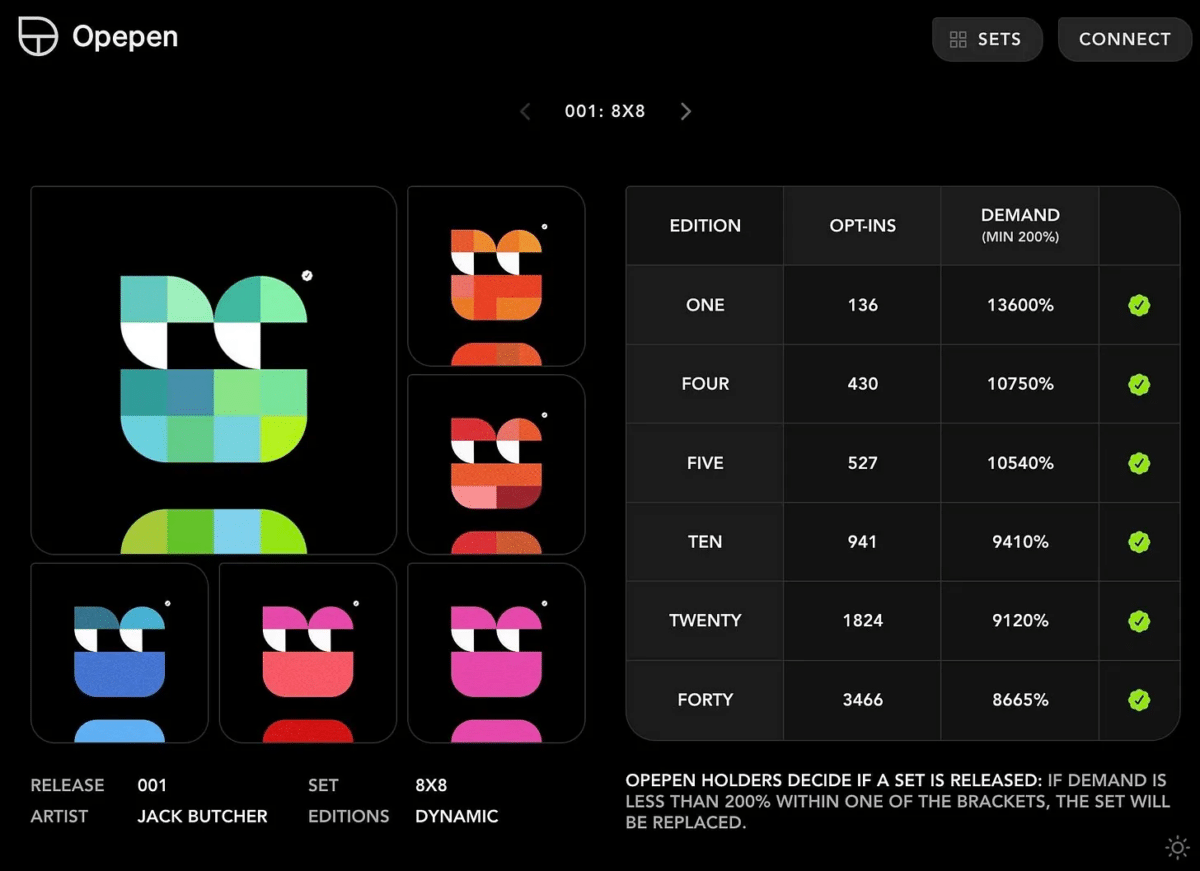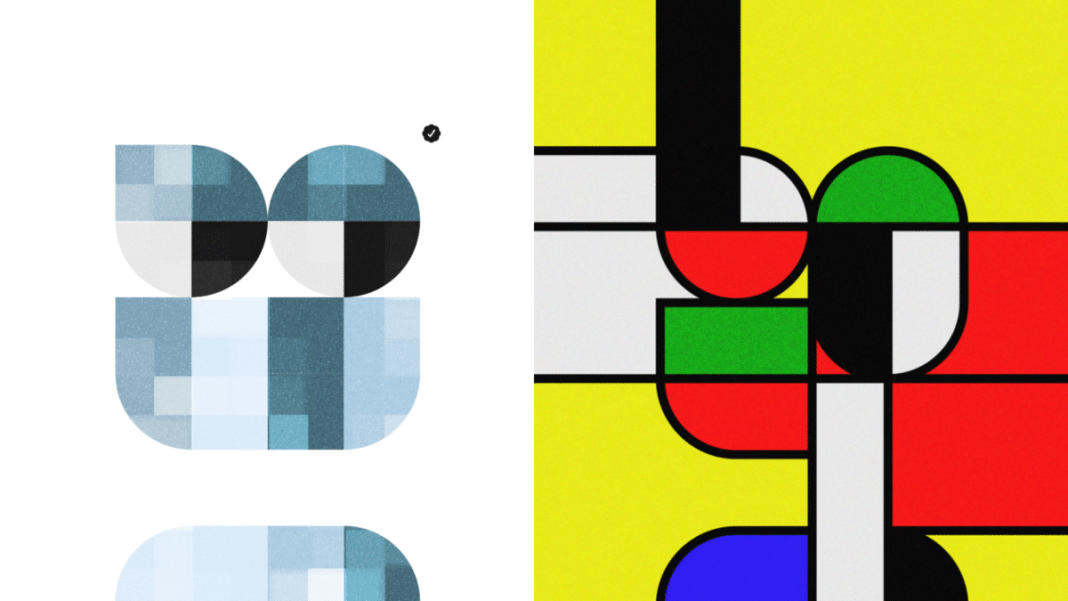Web3 has no shortage of “crossover episodes,” moments in crypto art culture where projects, memes, and personalities bleed into and influence each other in significant ways. Beeple’s daily commentary on the NFT space is a good example of this, but he is far from the only influential voice turning existing trends into something fresh and new, whether that’s a simple observation or a fully-fledged Web3 project.
One of the most enduring symbols in the crypto world is Pepe the Frog, the iconic 2005 cartoon character created by Matt Furie. Since its creation, Pepe the Frog has become one of the internet’s most recognizable (and misappropriated) memes. In Web3, it has shown up in everything from NFT projects based on the character to eponymous cryptocurrency memecoins.
So it’s little surprise that Pepe influenced the creation of Opepen, one of the latest NFT collections from Web3 wizard Jack Butcher, the artist behind the highly successful Checks NFTs project and creative agency Visualize Value. Opepen is a collection of 16,000 open-edition NFTs whose artwork changes over a series of drops and reveals.
The project features the dynamism that Butcher has come to be known for in the space, and with a trading volume of more than 63,250 ETH ($116 million) and individual sales of nearly 31 ETH ($58,000), Opepen has gained the attention of all of Web3. Here’s everything you need to know about it.
What is Opepen?
Despite the project’s major volume, Opepen isn’t just another digital art NFT collection; it’s also a community-driven experiment that explores the concepts of uniqueness, scarcity, and abundance in Web3.
As much as it was inspired by Pepe meme culture, Opepen also took its cue from the geometric works of digital artist batz, whose series of artworks made using only squares and circles caught Butcher’s attention this spring. Butcher decided to create his own version of batz’s style, using only rectangles and ellipses. He called the project Opepen, a portmanteau of the “open” in open edition NFTs, and “Pepe,” the controversial frog meme ubiquitous to Web3.
For some context on this piece, my timeline has been full of the incredible work of @batzdu for the last few days, please check out and support.
Secondarily, 24 x 72 canvas and name “scapepe” inspired by the legendary @scapes_xyz banner project.
Banner ready attached: pic.twitter.com/1PCq15lfsr
— Jack Butcher (@jackbutcher) January 8, 2023
Opepen launched on January 8, 2023, as a 60-minute open edition NFT drop. But this wasn’t your average open edition. First, the NFTs themselves weren’t revealed immediately, but rather over a series of drops that occur periodically (on a timeline that Butcher decides at random).
What’s more, each drop includes 80 Opepens out of the total 16,000 (with 200 sets included in the entirety of the project). Each Opepen owner has to opt-in to artwork previews that they like (by signing a message in their crypto wallet) to have the full NFT revealed (which will only occur if the proposed metadata change receives a 200 percent opt-in rate).
Some of the drops are like art print editions, meaning everyone in the set will get the same artwork. Others include small variations or even 1/1 works. Even after opting in, however, the distribution of the art is random.
opepen tldr
→ every opepen has a preset edition size
→ opepen are revealed in sets of 80 (200 sets total)
→ you opt-in to sets you like (artwork preview)
→ sets only drop if there is a 200% opt-in ratequestions? pic.twitter.com/v8zSDlIOTi
— Jack Butcher (@jackbutcher) April 30, 2023
For the 200 percent opt-in to occur, the 80-NFT drop requires at least 160 opt-ins. So far, the demand for the drops has been well over that limit, sometimes reaching more than 10,000 percent.
By creating this system, Butcher wanted to experiment with the idea of uniqueness in the digital realm, a theme that often crops up in his Web3 projects. But instead of leaning into themes of scarcity and rarity as he did with Checks, Butcher is playing with the concept of abundance in art and how that influences the choices his collectors make. With Opepen, he also wanted to foster a sense of community among his collector base by allowing them to participate in the reveal process and influence the outcome of each drop.

The evolution of Opepen has been marked by Butcher’s transparent leadership style. He has continually shared updates and engaged in discussions about the project via Twitter, giving enthusiasts an insight into the project’s development and future and allowing holders to provide feedback while opening the door to further artist collaborations.
Who started Opepen?
Butcher is a British-born artist, designer, and writer based in New York City and the founder of Visualize Value. This platform creates and sells digital products that help people communicate more effectively.
Visualize Value started as a side project in 2017, where Butcher shared minimalist graphics that distilled complex ideas into simple visuals on social media.
— Jack Butcher (@jackbutcher) June 4, 2023
Butcher is also an avid NFT creator and collector. When he released the open edition for his January 2023 collection Checks, each Check was minted for $8 and has since done over 54,800 ETH ($100 million) in volume at the time of writing.
According to an April 17, 2023 tweet by Butcher, his intention as an NFT creator is “the preservation of moments in time driven by big technological shifts. The output: ‘artifacts’ that capture these moments. For Checks, the disruption of top-down institutional trust, and the normalization of bottom-up truth seeking.”
Opepen’s rise to prominence
Opepen’s success can be attributed to several factors. First, Opepen benefits from the reputation and vision of Butcher, who is widely respected and admired for his previous collections.
conceptually speaking, you can make every single digital image in existence with the pieces above
remixed to infinity
— Jack Butcher (@jackbutcher) February 21, 2023
Second, Opepen stands out for its innovative drop mechanics that challenge the norms of NFT collections. Opepen doesn’t reveal the art for its drops all at once, and it doesn’t only rely on rarity traits to create value.
Instead, Opepen creates an abundance of art and choice for its collectors, allowing them to opt-in to different drops and receive random artworks from different artists. In this way, Opepen creates a sense of anticipation and participation in a way that other collections don’t. Moreover, Opepen rewards its collectors for holding Checks NFTs, which creates buying utility for both of Butcher’s projects.
In fact, one of the rarest Opepens minted so far is a “Black Opepen Check,” which is an amalgam of Butcher’s projects.
The first all Black Opepen Check. ✍🏻 pic.twitter.com/sc2XJ2rjWt
— E ◵◵* (@BB88888888888BB) June 6, 2023
The future of Opepen
Opepen is still in its early stages, as only six drops out of 200 have been completed so far. There are still many more to come, featuring more artworks by Butcher and guest artists. Some of the guest artists that have been confirmed or hinted at include Robert Mallary, who creates generative art based on his physical sculptures; falsehigh, who creates gradient-based art; and ripe0x, who creates pixelated art.
Opepen is an experiment that tests the boundaries of digital art. Each NFT is a step in an open-ended adventure that invites anyone who is curious and creative to join in.










